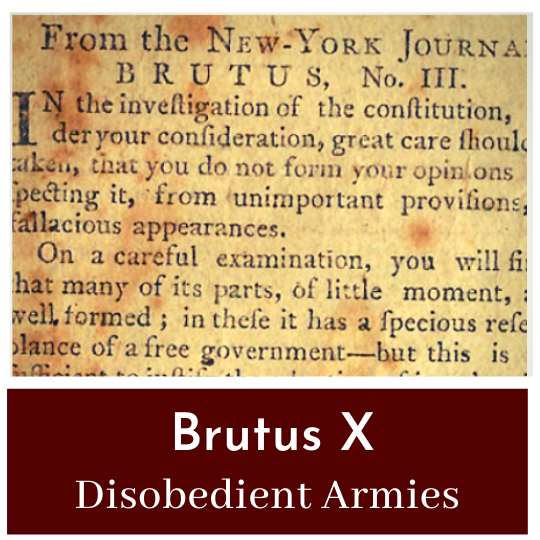Not Just The Government, But The Army Itself - Brutus X
In Brutus X an anonymous author further elaborates on his criticism of a standing army in times of peace.
Brutus X
January 24, 1788
In Brutus X the anonymous author returns to his criticism of a standing army in times of peace.
The essay discusses why a government abusing a standing army is not the only danger.
Rather, that army ignoring the government and instituting its own tyrannical rule should be equally as feared.
A Brief History of Armies
Brutus X begins with a bit of a history lesson.
He discusses both Caesar in Rome and Oliver Cromwell in seventeenth century Britain. Both of these men led armies in some of the freest (and most powerful) empires in the history of the world.
Both men also used their militaries to take over their governments and put into place restrictive governments that swallowed the liberty of the people.
The Newburg Conspiracy
Brutus then mentions the Newburg Conspiracy, a moment in time where the Continental Army actually considered taking control of the Continental Congress under the failing (as they saw it) Articles of Confederation.
Brutus rightfully gives credit to George Washington for standing above this kind of action, but uses it as a warning to demonstrate how easily an army can turn against its government.
But…We Just Did That
The essay then turns its attention to Alexander Hamilton’s assertion in Federalist Paper #25 that Shays’ Rebellion in Massachusetts demonstrates the need for a standing army to suppress insurrection.
Brutus questions this entirely, pointing out that Massachusetts was able to suppress Shays’ Rebellion without a standing army. They simply raised an army in time of need, used it appropriately, then disbanded it.
Restrictions
Brutus’ main point in Essay X is similar to that of his previous papers...there need to be limits.
He even writes out a passage that should be included in the Constitution to rectify the situation.
Essentially, Brutus says that enough men should be raised to guard the forts and a proper army should be permitted in times of war or imminent danger.
He simply thought that holding a standing army in time of peace could only hurt the people.
This series is only part of my regular publications, so…
If you want to keep up with all the Founders, make sure you subscribe to my daily newsletter here:
Here is a link to the earlier Essays of Brutus I have covered:





